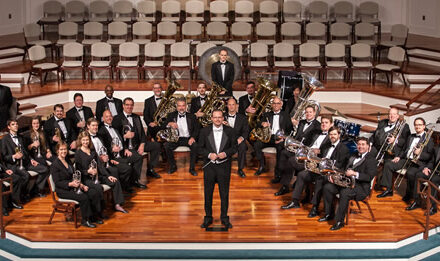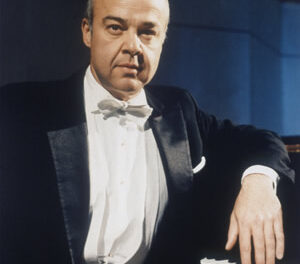Music for a Great Space‘s “Season of Inspiration” 2022-23 was supposed to open Friday night (9/31), but Hurricane Ian blew in . . .”it was a dark and stormy night.” Fortunately, the concert was given the following day, and those in attendance enjoyed a varied program from pianist James Giles, a musician known to many in the Triad. Giles grew up in this area and studied piano with several local faculty members at UNCG and School of the Arts. He currently serves as professor at Northwestern University and has formerly been a faculty member of the Eastern Music Festival.
Giles warmed up the audience with three works by Franz Liszt (Hungary, 1811-86). The composer wrote several compositions titled “Ave Maria,” for piano as well as other forces. The two versions that Giles played showed a more intimate and introverted Liszt, usually known for his flamboyant virtuosity.
The first was written in 1881 and was played with introspective sensitivity, one of the hallmarks of Giles’ playing throughout the program. The second, also known as “The Bells of Rome,” was written some 20 years earlier. The listener could easily imagine hearing the bells. Again, Giles’ gentle playing and his breath-taking pianissimos were a delight to hear.
His playing of the Ballade No. 2 in B minor certainly satisfied those wanting to hear a more dramatic Liszt. The work, as Giles explained to the audience, is based on a Greek myth of Hero and Leander, a tragic tale of love. There are two main themes: the opening tune accompanied by roiling scales in the left hand and a broad choral theme. The stormy sections provided Giles excellent opportunities to display his technical prowess in brilliant bursts of virtuosity.
Lowell Liebermann (United States, b. 1961) wrote his Sonata No. 3, Op. 82 in 2003 for Giles, who premiered the work. This is a composition that is by turns darkly dramatic, tonal, thorny, and ethereal. Giles’ playing was masterful with convincingly powerful rhythms, exquisitely delicate timbres, and flying fingers. He perfectly caught the shifting moods: angry outbursts, burning energy, and gentle pleading. You can hear a Giles performance of the work on YouTube.
Three short works from Album for the Young, Op. 68 by Robert Schumann (Germany, 1810-56) followed intermission. Giles explained that while pieces from this collection are usually assigned to beginning and intermediate pianists, he finds them to be quite lovely. The three works he chose to play are the only ones in the collection without a title. Giles’ playing was gentle and intimate, bringing out inner voices not always heard in recordings.
The printed program ended with a perennial favorite, Sonata quasi una fantasia, Op. 27, No. 2 (“Moonlight”) by Ludwig van Beethoven (Germany, 1770-1827). The famous opening, with its repetitive triplets, was lovingly played. Giles was able to bring out the melody clearly without the octave doubling that one sometimes hears. The middle movement was light and bouncy. The finale was about as dramatic and dark as one could ask for. Sometimes I thought that it was a bit too fast, as I would have liked to hear some of the soulful melodies a bit clearer. But Giles’ performance reminded me of what a creative genius (and brilliant pianist) Beethoven was.
The pianist returned to the stage several times, acknowledging the hearty applause, and treated us to an encore: MacDowell’s “To a Wild Rose.” This simple, gentle piece served as an appropriate closing to an evening marked by drama, fire, and passion.












